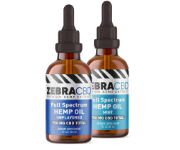
CBD, or cannabidiol, is a compound that’s found in both cannabis plant types — both hemp and marijuana. It’s believed to affect the body and brain via receptors throughout the nervous and immune systems.
That said, is CBD addictive like its cannabinoid cousin, THC? No.
According to the World Health Organization (WHO), CBD is non-addictive: “In humans, CBD exhibits no effects indicative of any abuse or dependence potential,” the organization states.
So, how exactly does CBD work within the body once it’s consumed, and what benefits can it potentially deliver? Let’s explore.
CBD and the Body
Within the body, there are compounds called endocannabinoids. These lipid-based neurotransmitters are naturally occurring cannabinoids that exist throughout the body and help to regulate several functions to maintain balance within the body. These functions include:
- Sleep
- Mood
- Appetite
- Memory
- Learning
- Body temperature
- Aches
- Immune function
- Fertility
Namely, endocannabinoids regulate communications between nerve cells at synapses — where this communication occurs.
So far, researchers have identified two types of endocannabinoids:
- Anandamide (AEA)
- 2-arachidonoylglycerol (2-AG)
Endocannabinoids also bind to two types of cannabinoid receptors: CB1 and CB2. There are large quantities of CB1 on the nerve cells of the brain and spinal cord, and there are lower amounts in various organs and tissues. CB2 receptors, while not as largely understood, are believed to situate themselves among the immune system’s white blood cells, as well as on the tonsils and the spleen.
The endocannabinoid can trigger a variety of effects, depending on the location of the receptor.
When we consume a cannabinoid like CBD, it can mimic the function of endocannabinoids. Thus, it’s believed that cannabinoids may be able to help regulate bodily functions in a similar fashion as endocannabinoids.
For example, it’s believed that THC can mediate psychoactive effects by binding to CB1 receptors in the central nervous system, namely the brain and spinal cord, which is why it’s considered to have potentially addictive properties.
CBD, on the other hand, is partial to the CB2 receptor. Although, it can interact with CB1 receptors, as well as non-cannabinoid receptors. It’s also believed that CBD may be able to interfere with the normal functioning of CB1 and may be able to reduce the effects of CB1 activators like THC and 2-AG. For this reason, THC products with a high CBD content typically have a less intense psychoactive effect.
Research has also found that CBD use may improve symptoms related to stress, physical discomfort, movement problems and cognitive issues.
In terms of CBD’s effects on mood, research has found that CBD can interact with the GABA-A receptors, which are found on nerve cells throughout the central nervous system. Essentially, CBD enhances the receptors’ ability to bind to gamma-aminobutyric acid (GABA) — a neurotransmitter that can produce a calming effect.
But cannabinoid receptors and GABA-A receptors aren’t the only receptors that CBD is believed to interact with. Studies have shown that CBD usage can influence several other types of receptors, including:
- Serotonin receptors – When consumed at high concentrations, CBD can activate the 5-HT1A (hydroxytryptamine) serotonin receptor, which can provide stress relief and potentially help with overall mental health. The receptor also influences sleep, physical sensation, vomiting and stomach discomfort.
- Vanilloid receptors – Also called transient receptor potential cation channel subfamily V (TRPV1), vanilloid receptors can mediate the perception of physical discomfort, inflammation and body temperature. CBD can bind to TRPV1, potentially relieving bodily aches.
- GPR55 orphan receptors– CBD may block or even deactivate the GPR55, which may reduce bone resorption.
- PPARs nuclear receptors – CBD can activate PPARs. Situated on the nucleus of cells, PPARs can reduce the progression and/or growth of abnormal cells. They also help to regulate genes that control energy expenditure and metabolism.
How Does CBD Enter the Body?
When functioning as a reuptake inhibitor — a substance that interferes with the reabsorption (reuptake) of specific neurotransmitters in the brain — CBD must enter a cell in order to interact with a receptor.
To enter the cell membrane, it must attach itself to a fatty acid. This is why many CBD products are created with carrier oils, such as MCT oil, hemp seed oil, olive oil, coconut oil and grapeseed oil — it improves the product’s bioavailability.
Concurrently, CBD can interfere and/or reduce endocannabinoids’ access to CB1 and CB2 receptors, thus taking control.
CBD For Sleep Support
In today’s modern age, stress is on the rise. High-stress conditions impact 40 million adults in the United States — that’s 19.1% of the population. Unfortunately, consistent stress can interrupt quality sleep.
According to the Baylor College of Medicine, stress is often tied to excessive thinking about work or school responsibilities, relationships and finances. Unfortunately, these types of thought patterns can disrupt sleep, making it more difficult to fall asleep quickly and stay asleep throughout the night.
This can lead to what’s called the stress-sleep cycle. A lack of sleep can further cause stress: A lack of sleep triggers the body’s stress response, in which cortisol is released. This can then impact sleep. You can explore our guide on how to destress if you feel you’re someone whose sleep is often negatively impacted by high-stress.
Per Doctor Annise Wilson, assistant professor of neurology and pulmonary, critical care and sleep medicine at the Baylor College of Medicine: “Research has shown that sleep plays an important role in learning and memory. Chronic sleep deprivation also has been associated with decreased metabolism and endocrine dysfunction.”
For this reason, many people turn to sleeping medication — mainly, prescription sleeping pills. While many of these medications can assist with falling and staying asleep, they also have a high likelihood of dependency and potential substance abuse. Additionally, sleeping pills can lead to several uncomfortable side effects, including:
- Dizziness or lightheadedness
- Headaches
- Diarrhea or stomach discomfort
- Prolonged drowsiness
- Hallucinations or agitation
- Memory or performance problems
Potentially addictive sleeping prescription medication also increase the risk of falling during the night, particularly in older adults.
For alternatives to sleeping medication, Wilson recommends creating an inviting sleeping environment: unwind with a warm bath or cozy book, reduce screen time and caffeine before bed and eliminate light exposure in your bedroom.
CBD is also a viable option. As mentioned, one of the main CBD oil benefits is that it can interact with several receptors to help regulate your sleep-wake cycle and relax your mind and body. It can have a calming effect on the nervous system and alter your mood through serotonin interaction.
The type of CBD you ingest may play a role, too. Generally, there are three types of CBD currently on the market: full spectrum CBD, broad spectrum CBD and isolate CBD.
Full spectrum CBD contains all of the cannabinoids, terpenes and flavonoids within the hemp plant — no exception. Accordingly, your body has a lot to work with. Namely, a cannabinoid called cannabinol (CBN). Anecdotal evidence reports that CBN can cause drowsiness, although most scientific studies are limited to clinical trials conducted in the ‘70s and ‘80s.
Full spectrum CBD also operates within something called the “entourage effect.” Essentially, it’s believed that the combination of ingredients works together to increase the effect of CBD usage, and older studies did find that the combination of CBN and THC did increase sleepiness among participants.
That said, for those looking for a THC-free option, broad spectrum CBD and isolate CBD use may be one of the better natural sleep remedies by interacting with certain receptors within the brain.
Even when CBD does contain THC, however, it is not an addictive substance. Legally, CBD can contain no more than 0.3% THC — if there's a higher THC content, you may want to think twice about the legitimacy of the product and its manufacturer.
How to Choose a Safe CBD Product
For those worried about dependency or passing a drug test, you’re generally safe with using a CBD product. That said, some manufacturers often do not meet the claims on their labels. To ensure that you’re buying a high-quality CBD product, check that it comes with its own Certificate of Analysis (COA).
A COA is conducted by a third-party lab, entirely independent from the manufacturer. It will test each product for its cannabinoid profile — that is, which cannabinoids are present within the product. It’ll also detail how much of the cannabinoid is present, as well as terpene and flavonoid percentages. You’ll also find a heavy metal analysis and pesticide analysis to confirm that there are no harmful contaminants within the product itself.
At Zebra CBD, we provide a database of each COA to help you ensure the accuracy of each one of our products.
Zebra CBD: A Safe CBD Option
CBD is not an addictive substance, even when it contains trace amounts of THC. Accordingly, it may be a viable alternative for people looking to support their sleep or moods.
If you’re looking to buy CBD online, look no further than Zebra CBD. We provide a variety of full spectrum CBD products made with premium hemp extract such as our signature hemp pills. In particular, our full spectrum blend CBD oil is formulated to support healthy sleep cycles, post-workout recovery and overall health and wellness. You can also shop our CBD tablets and CBD gummies for sale for a convenient on-the-go way to add CBD to your wellness routine. Plus, our products come in a wide variety of delicious flavors, ranging from mint to citrus.
Find the relief you’ve been searching for by shopping our CBD arsenal today.
Sources:
- University of South Carolina. People produce endocannabinoids – similar to compounds found in marijuana – that are critical to many bodily functions. https://sc.edu/uofsc/posts/2023/02/conversation_marijuana.php
- Partnership to End Addiction. Is CBD Safe for Teens? What Parents Should Know About Cannabidiol. https://drugfree.org/article/is-cbd-safe-for-teens/
- Project CBD. How CBD Works. https://projectcbd.org/science/how-cbd-works/
- APA. Stress and Sleep. https://www.apa.org/news/press/releases/stress/2013/sleep
- BCM. How Stress Can Affect Your Sleep. https://www.bcm.edu/news/how-stress-can-affect-your-sleep
- Mayo Clinic. Prescription Sleeping Pills. https://www.mayoclinic.org/diseases-conditions/insomnia/in-depth/sleeping-pills/art-20043959
- Sleep Foundation. CBD as a Sleep Aid. https://www.sleepfoundation.org/sleep-aids/cbd-for-sleep
- Sleep Foundation. CBN for Sleep. https://www.sleepfoundation.org/sleep-aids/cbn-for-sleep









